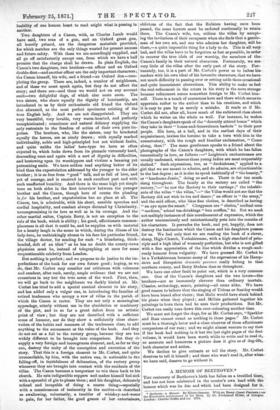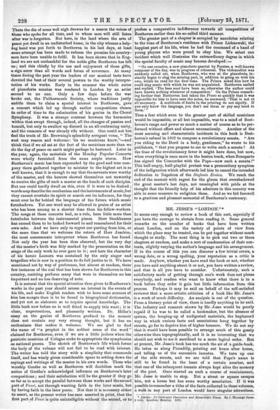A MEMOIR OF BEETHOVEN.* THE centenary of Beethoven's birth has
fallen on a troubled time, and has not been celebrated in the master's own land with the honour which was its due and which had been designed for it.
• Beethoven: a Memoir. By Elliott °memo. With an Essay (Quasi Fantasia) on the Hundredth Anniversary of his Birth. By Dr. Ferdinand Hiller, of Cologne. London : Charles (Irma and Co. 1810.
There the din of arms well nigh drowns for a season the voices of those who spoke for all time, and to whom men will still listen after war is forgotten. But here, in the land where the arts of peace yet dwell in an undisturbed home, in the city whence a help- ing hand was put forth to Beethoven in his last days, at least some attempt has been made to redeem the promise his country- men have been unable to fulfil. It has been shown that in Eng- land we are not unthankful for the noble gifts Beethoven has left ; and this chiefly by the use and enjoyment of those gifts, a sign surer than all words and forms of reverence. At many times during the past year the leaders of our musical taste have devoted the best of their several powers to the worthy interpre- tation of his works. Early in the summer the whole series of pianoforte sonatas was rendered in London by an artist second to no one. Only a few days before the war broke out, the Philharmonic Society, whose traditions justly entitle them to claim a special interest in Beethoven, gave a concert which led up through earlier compositions chosen in order of time to the culmination of his genius in the Choral Symphony. It was a strange contrast between the harmonies within that swept through, indeed, all the changes of passion and tumult, but only to swallow up discord in an all-embracing unity, and the rumours of war already rife without. One could not but feel the truth of Mr. Browning's splendidly arrogant verse, " The rest may reason and welcome : 'tis we musicians know,"—and think that if we all sat at the feet of the musicians more than we do the day of peace on earth might perhaps be hastened. Later in the year, again, the materials of the Monday Popular Concerts were wholly furnished from the same ample stores. How Beethoven's music has been expounded by the good and true com- pany there gathered together to minister to the highest art is so well known, that it is enough to say that the servants were worthy of the master, and the hearers showed themselves not unworthy to receive the gifts of such a master at the hands of such disciples. But one could hardly dwell on this, even if it were to be desired ; words may describe the mechanism and the instruments of music, but they cannot overtake its spirit or search out its influence, for they must ever be far behind the language of the future which music foreshadows. Yet one word may be allowed in praise of an artist who has been among us a shorter time than his fellow-workers. The songs at these concerts had, as a rule, been little more than interludes between the instrumental pieces. Herr Stockhausen has caused them to be looked forward to and remembered for their own sake. And we have only to regret our parting from him, at the same time that we welcome the return of Herr Joachim, the most consummate intrepreter whom Beethoven has found. Not only the year has been thus observed, but the very day of the master's birth was fitly marked by the presentation on the stage of the only work he ever gave to it ; and here the character of his heroic Leonora was sustained by the only singer and tragedian who is now in a,position to do full justice to it. We have mentioned not by way of preference, but almost at random, these few instances of the zeal that has been shown for Beethoven in this country, omitting perforce many that were in themselves no less important and no less deserving of note.
It is natural that the special attention thus given to Beethoven's works in the past year should arouse an interest in the events of his life, and make English readers wish to have some account of him less meagre than is to be found in biographical dictionaries, and yet not so elaborate as to require special knowledge. The little book now before us is well fitted to supply this want ; it is clear, unpretentious, and pleasantly written. Dr. Hiller's essay on the genius of Beethoven prefixed to the memoir does not contain any very strong thought, but it has an enthusiasm that makes it welcome. We are glad to find the name of "a prophet in the noblest sense of the word"
• claimed for Beethoven, even if we are a little jealous when the patriotic musician of Cologne seeks to appropriate the symphonies as national poems. The sketch of Beethoven's life which forms the body of the volume will not fail to be read with interest. The writer has told the story with a simplicity that commends itself, and has wisely given considerable space to setting down the sayings and writings of the master in his own words. Those who worship Goethe as well as Beethoven will doubtless mark the notice of Goethe's acknowledged influence on Beethoven's later .compositions ; and their satisfaction will be the greater if they go
• so far as to accept the parallel between those works and the second part of Faust, not through wanting faith in the later music, but by having faith in the later poem. Not that it is necessary either 'to assert, as the present writer has seen asserted in print, that the first part of Faust is quite unintelligible without the second, or to
profess a comparative indifference towards all compositions of Beethoven earlier than his so-called third manner.
The greater part of a chapter is occupied by anecdotes relating to the time of Beethoven's residence with Prince Lichnowski, the happiest part of his life, when he had the command of a band of young players who were proud to obey him. We select one incident which well illustrates the extraordinary degree in which the special faculty of music may become developed:-
" On one occasion, a new pianoforte quartet by Forster, a well-known composer of the day, was in progress of rehearsal. The violoncellist was suddenly called out, when Beethoven, who was at the pianoforte, in- stantly began to sing the missing part, in addition to going on with his own, which he read for the first time. The Prince asked him how he could sing music with which be was not acquainted. Beethoven smiled and replied, ' The bass must have been so, otherwise the author could have known nothing whatever of composition.' On the Prince remark- ing further that Beethoven had taken the Presto so quickly that it was impossible for him to have seen the notes, he answered, That is not at all necessary. A multitude of faults in the printing do not signify. If you only know the language, you don't see them or pay any heed to them.' "
Thus a feat which even to the greater part of skilled musicians would be impossible, or all but impossible, was to a mind of Beet- hoven's range and power so much a matter of course as to be per- formed without effort and almost unconsciously. Another of the most amusing and characteristic incidents in this book is Beet- hoven's refusal in 1802 to compose a revolutionary sonata. " Are you riding to the Devil in a body, gentlemen," he wrote to his publishers, " that you propose to me to write such a sonata ? At the time of the revolutionary fever it might have done, but now, when everything is once more in the beaten track, when Bonaparte has signed the Concordat with the Pope—now such a sonata !" This half.angry, half-playful protest was a premonitory symptom of the indignation which afterwards led him to cancel the intended dedication to Napoleon of the Sinfonia Eroica. We reach the end of the memoir with regret for the gloom that overshadowed the great master's last days, not unmingled with pride at the thought that the friendly help of his admirers in this country was able in some measure to enlighten them. And so we bid farewell to a gracious and pleasant memorial of Beethoven's centenary.



































 Previous page
Previous page